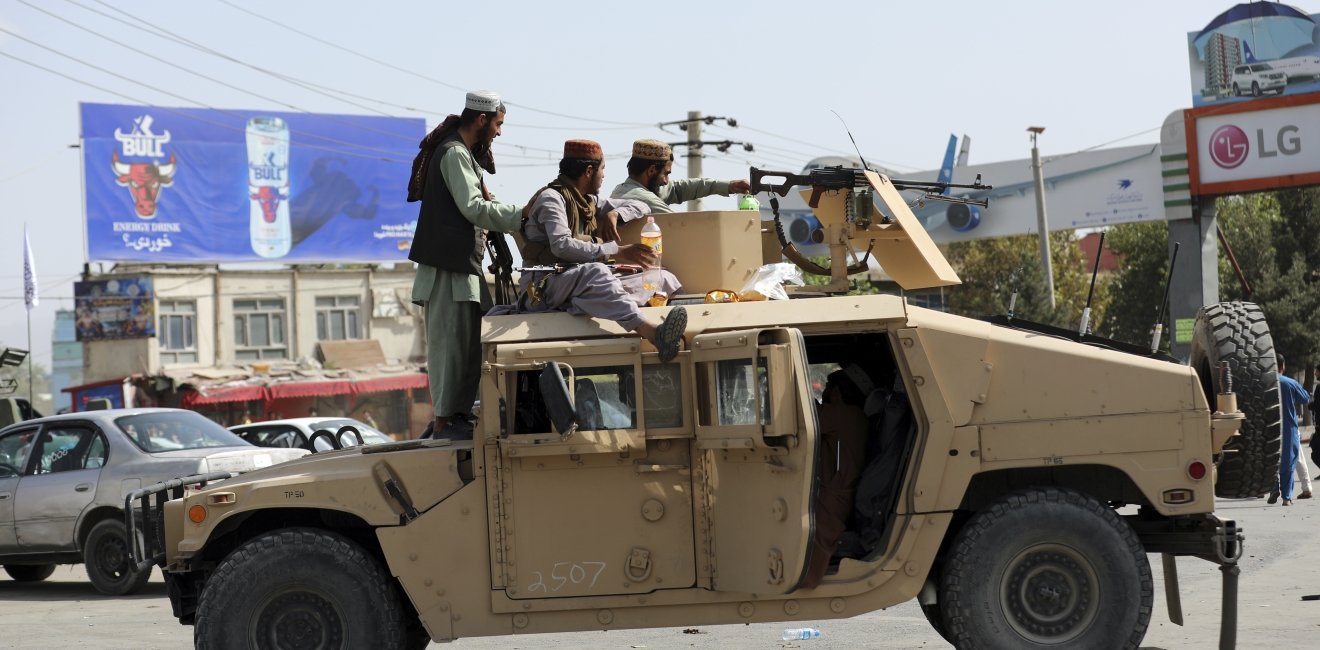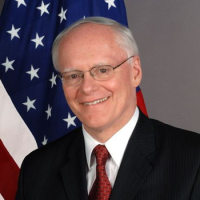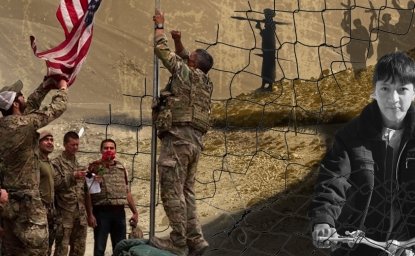The Deteriorating Situation in Afghanistan: Expertise from the Wilson Center
Experts from the Wilson Center examine the implications of what is unfolding for Afghanistan, its people, the region, and the United States.
Experts from the Wilson Center examine the implications of what is unfolding for Afghanistan, its people, the region, and the United States.

Recent days have witnessed the rapid collapse of the Afghan military and the resignation of its government, with the Taliban returning to national power after nearly two decades of conflict. American diplomats and development officials are being evacuated from Kabul by the U.S. military, and thousands of Afghans are attempting to flee. Experts from the Wilson Center – rated best in the world for regional studies for several years – examine the implications of what is unfolding for Afghanistan, its people, the region, and the United States.
Explore the Wilson Initiative the examines the implications of the U.S. withdrawal from Afghanistan, Hindsight Up Front. Watch strategic discussions the Wilson Center has hosted in recent weeks with former National Security Advisor HR McMaster as well as former CIA Director David Petraeus and former MI-6 Chief Sir John Scarlett. Learn more with the Wilson Center videos on Why Afghanistan Still Matters and the implications of the return of Taliban rule.
To arrange an interview with any Wilson Center experts, email Ryan.McKenna@wilsoncenter.org.
My area of expertise lies in India’s economic relationship with other states, while the Taliban’s sweep of Afghanistan and the fall of Kabul are primarily issues of national security for India. Here I offer some preliminary thoughts on how these developments could impact India’s economic relations in Asia.
The poor management of the military (and now diplomatic) withdrawal of the United States and the rout of Afghan forces by the Taliban have hurt the reputation of the United States both for competence and for reliability as a partner. This reinforces China’s message to its maritime Asian neighbours that, under the Biden Administration, the United States is too preoccupied with its domestic challenges to devote significant attention to either the defence or to the economic recovery of a post-pandemic east and south-east Asia.
With the Belt and Road Initiative and the ASEAN-centred RCEP trade agreement China has evolved a framework to encourage deeper integration of Asian maritime economies with itself. The rout in Afghanistan is likely to encourage even the more pro-U.S. states (Japan, Australia, Vietnam, Singapore) to hedge their pro-U.S. bets (5G, technology) without visible demonstration of U.S. economic commitment to the region. The most visible such sign, reopening negotiations to join the Japan-led CPTPP, seems unlikely under a Biden Administration. In this respect, the United States and India are alike: partners, through the Quad with major Pacific powers, but without the extra propellant of a regional trade deal.
More intriguing is what these developments might mean for U.S.-China political engagement, and the impact on India. The United States and China have a shared interest in ensuring that a Taliban-ruled Afghanistan does not become a breeding ground for exporting Islamist ideology; both have significant leverage over the main patron of the Taliban, namely Pakistan. While Afghanistan is a side-show in the larger drama of U.S.-China relations, it could provide an opportunity for co-operation in the security sphere with spill over effects in other areas. India would have an interest in such U.S.-Chinese cooperation if it reined in the Pakistan ISI’s deflection of jihadi militants toward India which is otherwise the most likely scenario.
Suman Bery
Global Fellow, Asia Program
China’s propaganda organs will miss none of the opportunities afforded by the catastrophe in Afghanistan. It will be hard for the Chinese people to believe that “America is back” or that it deals with China from a “position of strength” amidst the rubble of Kabul. The Taliban’s victory is the latest chapter in the Chinese narrative of American failure that runs from the Financial Crisis, through the election of Donald Trump, the January 6th insurrection, and the poor handling of the pandemic. The Chinese Communist Party has told its people that the United States is arrogant, imperialistic, and keen to interfere in the affairs of other nations since the People’s Republic was founded in 1949. In lending credence to those accusations, America’s defeat will strengthen Beijing’s belief that China has chosen the superior political path.
But schadenfreude is the easy part; in the short and medium term, chaos in central Asia is a threat to China. Beijing knows that clearing away distractions to focus on competition with China is one of President Biden’s motives for pulling out of Afghanistan, but that is probably not its greatest concern. China is worried than an Islamist state on its border could export violence to Xinjiang and that tribal and military leaders who flee to Tajikistan and Uzbekistan could destabilize the Central Asian region, which is an important supplier of energy to China and which is essential to China’s rail links with Europe. An ascendant Taliban and inspired Islamists in Pashtunistan and Baluchistan could also endanger the tent-pole project in China’s Belt and Road Initiative: the China-Pakistan Economic Corridor.
Securing its borders and stabilizing the region through trade, infrastructure lending, and development of extractive industries are China’s highest priorities in Central Asia. That is why China’s foreign minister hosted a Taliban delegation in Beijing in late July and why Xi Jinping may be one of the first foreign leaders to recognize the new Afghan government. But the financial and reputational risks of cozying up the Taliban are high. Expect Beijing to amplify America’s failure, but to be extremely cautious about replacing the United States as Afghanistan’s great power patron.
Robert Daly
Director, Kissinger Institute on China and the United States
All we know now is that the collapse of the Afghan military and government is a disaster for the cause of peace and freedom for the people of Afghanistan. The long-term implications of recent days will play out in the coming years and decades, with major implications not only for the people Afghanistan, but also for its region and for the United States.
While the future of Afghanistan is unclear, its neighbors and nearby major powers – especially Pakistan, China, Iran, India, and Russia – will have an outsized role to play. Expect Islamabad and Beijing will be especially active in trying to shape the new government in Kabul and managing its international effects. China’s leaders will be especially sensitive to containing the spread of instability and international terrorism and, while they will be deeply reluctant to engage in the kind of nation building the United States attempted over the previous two decades, it will seek to maximize the appearance of Chinese power and American decline.
Yet – as with the fall of South Vietnam in 1975 – I do not expect U.S. allies or adversaries to view this as an indication of a significant change in American power, reliability, or determination. Rather, they watch to see if the United States can overcome its roiling domestic politics, adjust its strategy and investments to compete more effectively with a still-rising China, and rebuild an international system that can better address existing and emerging challenges around the world.
Abraham M. Denmark
Director, Asia Program
Senior Fellow, Kissinger Institute on China and the United States
Although America’s NATO allies agreed with Washington’s decision to leave Afghanistan, Europeans have been shocked by the rapid pace of the Taliban’s advance. As late as last week some European countries were still deporting Afghan asylum seekers because they deemed Afghanistan to be "safe." They now fear that a mass exodus of Afghans heading for Europe could overwhelm their welfare and security systems, generate new tensions across the continent, and spark renewed support for right-wing groups. Since 2015, around 570,000 Afghans have requested asylum in the European Union, ranking Afghanistan just after Syria as the most important country of origin in 2020. Those numbers are likely to spike in coming months.
Since the 2015 migration crisis, the European Union has made it much tougher for migrants to enter. Nonetheless, individual European countries are likely to take in more Afghan refugees, and some are looking at creating special programs to facilitate access for at-risk Afghan citizens who worked with Europeans over the past 20 years. Meanwhile, the EU as a whole is more likely to do what it usually does when faced with such crises: pull out its checkbook. Relief organizations and countries in the region alike will look to European financial support to address the humanitarian crises that will not only engulf Afghanistan, but will become manifest on critical borders such as those between Turkey and its neighbors Iran and Greece.
Europe is as implicated in the abandonment of Afghanistan as is the United States. Together the transatlantic partners must now mobilize a wider coalition of countries behind a broad resettlement program in the face of this humanitarian catastrophe, much as was done with the Vietnamese boat people after 1979.
Daniel S. Hamilton
Director, Global Europe Program
Austrian Marshall Plan Foundation Distinguished Fellow
The unfolding situation in Afghanistan marks a human tragedy, and sadly, it will get worse. As we think through the strategic and geopolitical implications of a Taliban takeover, we must never lose sight of the human costs for Afghanistan—the lives lost, the freedoms forfeited, the dreams destroyed. And we must acknowledge that we, as a nation and a people, bear a considerable responsibility for the misfortune that is likely to be Afghanistan’s lot for the foreseeable future. This is, first and primarily, an Afghan tragedy, and any analysis must begin with that reality.
What will the collapse of Afghanistan mean for U.S. interests? Those who wish to see things in this light will view the fall of the Ghani government as one more indication that American might and influence has waned. Pakistan will interpret this as confirmation of America’s unreliability as an ally. China and Russia will likely be gratified by this very public humbling of their principal rival, although should a Taliban triumph in Afghanistan promote extremism elsewhere in the region, they may have second thoughts about the departure of the American military
Yet a realignment of American policies and interests so as to better focus on challenges of a higher priority is not a bad thing. Those with an historical bent of mind will also recall that following the American defeat in Vietnam, analysts predicted an American decline throughout the world. Yet less than 15 years later, these same analysts were referring to the United States as the world’s sole superpower. The U.S. defeat in Vietnam did not fundamentally undermine American power. If the United States can get its domestic house in order—admittedly a big if—the failure of the American project in Afghanistan is likely to carry equally modest implications for the future.
Robert M. Hathaway
Asia Program Director Emeritus
The American abandonment of Afghanistan although justified, given the views of the American people and lack of success in the conflict, is having a profound impact in the Middle East, which neighbors Afghanistan and is equally dependent upon an American security presence. Regional leaders now inevitably question American staying power and will. These doubts can be exploited by both the Iranians and Russians to erode the American-led security system. In addition the Arab world, generally successful in the last five years with American help neutralizing militant Islamic movements, will fear that those movements will be inspired by the Taliban’s success.
America’s role as a security guarantor is irreplaceable and extraordinarily valuable to America’s long term partners and to the American people. But Washington must reassure the region, with deeds, not words, that it will stand by its commitments. This means: maintain current or close to current force presence, collaborate better with regional partners to contest Iran’s expansionist effort, maintain leadership in the fight against terror and make no major concessions to Iran on the JCPOA.
Ambassador James F. Jeffrey
Chair, Middle East Program
Recent political developments in Afghanistan with the Taliban gaining more and more territory and power across the country is most probably the worst political outcome for women and girls in the country. After two decades of hard work, activism and rebuilding of educational institutions, civil society and women-led or owned enterprises, Afghani women stand to lose their most basic rights and freedoms under Taliban rule. This is not surprising. Even as the Taliban was at the negotiating table across from the Afghan government’s negotiators, there were targeted attacks against women, including “an assassination attempt on Fawzia Koofi,” one of the four women members of the Afghan government’s negotiations team. Last year, women entrepreneurs were constantly threatened that their children will be abducted, schools were attacked, and women university students were prevented from taking their exams in Badakshan Province, threatened with fines. Today, the fear of what the Taliban will do to girls and women in their ruthlessly rigid interpretation of Islamic text is forcing many Afghans to flee the country. According to UNHCR, 80% of those who have fled since May are women and children. Many young women in their twenties who were fortunate to have not lived under Taliban rule and have thus attained secondary and tertiary education are now terrified of what their parents, particularly their mothers , had witnessed of how the Taliban ruled the country. They forbade girls from school and work, prevented them from appearing in public without a male guardian as well as imprisoned and even stoned women accused of adultery. The upsurge in violence the country has witnessed as the Taliban took control of more cities will also lead many international NGOs that ran projects to build and strengthen education, women’s rights, and address problems such as gender-based violence to close shop and leave, that is already happening. The sliver of hope lies in the educated and determined Afghan women who will continue their work from their homes, where they will most likely be confined. But they will still be risking their lives to carry on that torch. They need all the support they can get.
Merissa Khurma
Program Director, Middle East Program
We may be hearing talk about a bloodless transfer of power and an end to a war that's raged for 40 years. But let's be clear: Better days are not here. It's not just the fact that a notorious extremist organization will soon, once again, hold political power, and not hesitate to use violence to impose order. It's also the fact that many Afghans won't accept the Taliban. Eventually, new resistance movements will emerge to take it on. We're looking at the possibility of a new civil war. A Taliban government will also provide more space to terror groups like al-Qaeda and ISIS that threaten Afghanistan and the region--and possibly, in due course, the United States.
The United States will soon have Afghanistan in its rearview mirror, but it can't disengage. The immediate goal should be humanitarian, and that means above all evacuations of U.S. citizens and Afghans that helped the U.S. military. But Washington needs to go further. IDPs in Afghanistan need help, and the United States should provide assistance to refugee organizations. Beyond this, the United States needs to mobilize its remaining tools of leverage--mainly threats to revoke future assistance or formal recognition-to push the Taliban to lay down its arms and stop committing brutalities. At the very least, the Taliban needs to agree to a ceasefire. It's gotten everything it's wanted: U.S. troops have left, President Ghani has left, and it's now taken power. It needs to formally declare an end to fighting. Until and unless it does that, no one should rest easy.
Michael Kugelman
Deputy Director and Senior Associate for South Asia, Asia Program
Afghanistan has fallen to the Taliban. I am reminded of W.B. Yeats’ words spoken a century ago that the worst are full of passionate intensity, while the best lack all conviction. The precipitate and hurried withdrawal of U.S. troops—the image of the exit from Bagram in the cover of darkness will be the image that history will not forget—and the imperfect, flawed nature of the agreements at Doha—provided the cue for the final Taliban onslaught. The country has reverted to default and one recalls Martin Ewans twenty years ago, that in its most acute form, Afghanistan is a ‘failed’ state, a divided nation and its people immersed in despair, have become once more the wretched of the earth.
The Taliban was and is a Pakistani creation. Its restoration to power in Kabul signals a victory equally for Pakistan. The speed and sophistication with which the Taliban have moved to secure strongholds through Afghanistan with record speed and precision point to a great deal of professional inputs from their minders in Pakistan. One by-product of all this will be that the terror pipeline that feeds most of the rest of the region— both Central and South Asia—will be back in business as the imposition of fundamentalist Islam over Afghanistan also means that supporting terror groups in the name of ‘jihad’ will have the automatic stamp of legitimacy. The Taliban proved during their flirtation with power in the nineties that they are the proponents of ideological overreach, and nothing in their recent behavior–both at Doha and now in their campaign to gain power—suggests that they have changed. The Taliban were never history in Afghanistan, they have now returned to be a part of its present, and they will seek to project their narrowly circumscribed, medieval vision of Islam even beyond the borders of the country they now control. The deep state in Pakistan has no reason to protest.
The United States is seen in the region as having backtracked ‘on everything’—especially by mainstreaming the Taliban—and this is the predominant feeling among the Afghans who want nothing with the Taliban and what they stand for. The U.S. withdrawal has also meant that there is now an open pathway for both China and Russia, whose partnership gets closer in the region, to become players who influence Afghan affairs. China in fact will now enter Afghanistan as a long-term player, and increasingly, for the rest of Asia, excluding nations like India, Japan and Vietnam, this is what the Asian order is going to look like with China as the sun in their sky. And China will work very carefully with Pakistan as this new phase begins. China has displayed no signs of discomfort with Afghanistan’s strategic subservience to Pakistan while the Iranians, the Russians and the Central Asians also have no fundamental quarrel with that state of being. India is the outlier in all this.
Nirupama Rao
Global Fellow, Asia Program
Cooperation between Moscow and Washington on Afghanistan has suffered from the broader downturn in relations between Russia and the West since 2014. However, Moscow remains interested in preventing a chaotic collapse in Afghanistan, which could have destabilizing impacts on neighboring central Asian states, and knock-on effects within Russia. Russian forces already provide border security and other assistance in the region under the auspices of the Collective Security Treaty Organization. They will be on high alert to prevent the outflow of terrorists, weapons and drugs from Afghanistan northward into neighboring Central Asian states and onward to Russia. While Russia may be open to limited forms of cooperation with major powers such as China, India, and even the United States on Afghanistan and regional security, it has also invested directly in cultivating relationships with senior Taliban leaders. Consequently, Russia now has some ability to exert direct leverage within Taliban-controlled Afghanistan.
Matthew Rojansky
Director, Kennan Institute
Excerpt:
There will be plenty of re-examination of the U.S. decision in April to give a September date certain for pulling out of Afghanistan, but events over the last few months make clear that the final U.S. decisions were based on a poor understanding of the damage already done to Afghan government morale, authority, and capacity by the U.S. negotiations with the Taliban, during the last two years of the Trump administration. The Taliban had used the last two years while negotiating with the United States to strengthen their political and military position in Afghanistan, building on grievances around the country and the political space created by divisions among Kabul leaders, as well as persistent corruption and poor governance at many levels, including in parts of the security services. The United States effectively reduced the credibility of the Kabul government by the way it conducted the negotiations with the Taliban and the follow-on treatment of the Kabul government. Trump’s repeated insistence on pulling out U.S. troops reinforced the demoralizing messages.
There were many analyses and studies that warned that this was happening which offered alternative recommendations, but they were not heeded or accepted during the Trump administration or by the new Biden team. Following the April decision to withdraw, the U.S. administration continued to badly undermine Afghan morale with public messaging designed for a U.S. domestic audience about how the Afghan conflict was not winnable. This strongly affected the views and morale of Afghan civilians, military, and local governments. The United States promised continued diplomatic, economic and defense support for Afghanistan during and after the troop departure, but it did not take clear and concrete steps to demonstrate that support, which would have boosted the will of those resisting the Taliban. For those watching closely in the United States or in Afghanistan, it was hard to detect any priority effort to provide additional support to Kabul.
Read the complete analysis from Earl Anthony Wayne here.
Earl Anthony Wayne
Public Policy Fellow, The Wilson Center
“It’s not just an epic defeat for the United States. The fall of Kabul may serve as a bookend for the era of U.S. global power. In the nineteen-forties, the United States launched the Great Rescue to help liberate Western Europe from the powerful Nazi war machine. It then used its vast land, sea, and air power to defeat the formidable Japanese empire in East Asia. Eighty years later, the U.S. is engaged in what historians may someday call a Great Retreat from a ragtag militia that has no air power or significant armor and artillery, in one of the poorest countries in the world.”
Read Robin Wright’s full piece in the New Yorker.
Robin Wright
USIP-Wilson Center Distinguished Fellow
Afghans are rightly concerned that the 'bloodless' Taliban rise to power will not stay that way. Fighting between the Taliban and their political opponents, intra-Taliban conflict, and clashes between militant groups will all contribute to a worsening security situation in the country. Areas under Taliban rule, particularly rural districts, will likely see a return to pre-2001 brutality; there are already reports of executions and forced marriages in Taliban-held areas.
Read Huma Yusuf's full piece on Asia Dispatches.
Huma Yusuf
Global Fellow, Asia Program













The Indo-Pacific Program promotes policy debate and intellectual discussions on US interests in the Asia-Pacific as well as political, economic, security, and social issues relating to the world’s most populous and economically dynamic region. Read more


The Global Europe Program is focused on Europe’s capabilities, and how it engages on critical global issues. We investigate European approaches to critical global issues. We examine Europe’s relations with Russia and Eurasia, China and the Indo-Pacific, the Middle East and Africa. Our initiatives include “Ukraine in Europe”—an examination of what it will take to make Ukraine’s European future a reality. But we also examine the role of NATO, the European Union and the OSCE, Europe’s energy security, transatlantic trade disputes, and challenges to democracy. The Global Europe Program’s staff, scholars-in-residence, and Global Fellows participate in seminars, policy study groups, and international conferences to provide analytical recommendations to policy makers and the media. Read more


After more than 50 years as a vital part of the Wilson Center legacy, the Kennan Institute has become an independent think tank. You can find the current website for the Kennan Institute at kennaninstitute.org. Please look for future announcements about partnership activities between the Wilson Center and the Kennan Institute at Wilson Center Press Room. The Wilson Center is proud of its historic connection to the Kennan Institute and looks forward to supporting its activities as an independent center of knowledge. The Kennan Institute is committed to improving American understanding of Russia, Ukraine, Central Asia, the South Caucasus, and the surrounding region through research and exchange. Read more


The Kissinger Institute works to ensure that China policy serves American long-term interests and is founded in understanding of historical and cultural factors in bilateral relations and in accurate assessment of the aspirations of China’s government and people. Read more


The Wilson Center’s Middle East Program serves as a crucial resource for the policymaking community and beyond, providing analyses and research that helps inform US foreign policymaking, stimulates public debate, and expands knowledge about issues in the wider Middle East and North Africa (MENA) region. Read more


